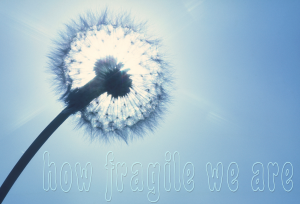“You never would have guessed what I had been through; where I had been. I didn’t look “crazy”-I never had. I looked like any other teenage girl. I went to classes with everyone else. I talked to other kids. I attended school events. I would have the [sic] seen your dance team, had I gone to Waunakee High School. And you would never have known. In fact, the next time you perform, I want you to look at the kids in the audience. About 1 in 10 children under the age of eighteen have a mental illness; 1 in 5 have a serious mental illness (SMI) like the ones you mock. ONE IN FIVE.
How many kids are watching you perform? How many are in your school? How about in your district? Your town?” ~ Erika, age 14
 I remember reading It’s Kind of a Funny Story, by Ned Vizzini, the YA novel which has recently gone on to movie fame. I was at first uncomfortable with how funny I found it — because Mental Illness Is Not Funny… but I reread it, and found myself relieved. It is real. It has poignancy and bright/dark moments which are so very normal to how life goes, to the way I feel. It’s Kind of a Funny Story is most important to me because it highlights the decision to live, and get help when faced with what a friend and I call Those Intrusive Thoughts that make hanging one’s toes off the edge of the Brooklyn Bridge at 3 a.m. seem like a really good idea.
I remember reading It’s Kind of a Funny Story, by Ned Vizzini, the YA novel which has recently gone on to movie fame. I was at first uncomfortable with how funny I found it — because Mental Illness Is Not Funny… but I reread it, and found myself relieved. It is real. It has poignancy and bright/dark moments which are so very normal to how life goes, to the way I feel. It’s Kind of a Funny Story is most important to me because it highlights the decision to live, and get help when faced with what a friend and I call Those Intrusive Thoughts that make hanging one’s toes off the edge of the Brooklyn Bridge at 3 a.m. seem like a really good idea.
Most of us have personal experience with those Intrusive Thoughts. Most of us have the dear friend/family/personal connection with mental illness. I know I do.
Mental health issues are the biggest elephant in the room, EVER. They are hugely awkward in our society. When the “American dream” is to, by our own effort, rule our particular little worlds, a loss of control through mental challenges has a massive stigma to the American — heck, to the WORLD public. No one wants to be associated with the stereotypical “crazy person” who has to miss days of work and school, staying home and struggling. No one wants to be “that guy,” the one who has to take medication, who sometimes emotes too much – the girl who cries or laughs too easily, who has blackout panic attacks in a crowded hallway, or who falls apart at the drop of a grade.
It is something we all fear. Therefore, it’s really easy… to make fun of it.
Which is what happened, inadvertently, a few weeks ago at a Wisconsin high school. The pep rally routine featured cheerleaders with black makeup smeared on their faces, snarled hair, scary expressions, and the words “Psych Ward” on their straitjacket-looking uniforms as they danced through a “fun and catchy” song to get school spirit up and going. “We Get Crazy” is the title of their routine.
All right. The finger-pointing and shouty bits of the dialogue can go on without our input, can’t they? We can agree that the routine was insensitive and surreal without all of the screeching, and we can also probably agree that it was a misjudgment by the head coach, who isn’t an Evil Person and didn’t intend to humiliate or shame, just create a dance to a “catchy and amusing” hip-hop song.
Conversely, some of us might even agree with the NBC sportswriter who claimed that it’s a political thing and wrong to teach kids to back down under pressure, and that the cheerleaders should go on if they feel okay about things, and everyone is oversensitive and too PC these days, and should shut up. Yeah, someone can probably agree to parts of all of that.
I was able to pass the news story without public comment until I ran across a letter of response. Erika, guest blogs her story without adding a last name (for obvious reasons), writes with frustration and passion to the head coach of Waunakee Wisconsin High School. She tells a story that is familiar to far too many.
I blink when I think about the statistics that Erika quotes. One in ten young adults below eighteen have a mental illness, one in five have a serious one. One in five is a REALLY big number. Does YA fiction reflect this? Or is this invisible to YA authors, too?
Other than Ned Vizzini’s book, what was the last book I read wherein someone had a serious mental challenge? Okay, there are some classics: the Sonya Sones book, Stop Pretending; Patricia McCormick’s Cut. There was an old book I remember reading called Lisa, Bright & Dark about a girl with severe mood swings. Deb Caletti’s Wild Roses comes to mind, as does When She Was Good, by Norma Fox Mazer (boy, that’s an old one.) More recently, Dia Calhoun wrote The Phoenix Dance, a fantasy retelling of the Twelve Dancing Princesses — cleverly paralleling their dance mania with bipolar disorder. The intensely arresting Tallulah Falls by Christine Fletcher is about a drop-everything kind of friendship, and a very impulsive friend.
There are more novels, there must be — can you think of them? Have you read anything that struck you as extraordinary? I’m thinking of making a list to post — fiction which depicts people with wonky brain chemistry leading lives with meaning and humor and balance, in spite of school and work and life’s crap.  Let me know if you find something which needs to be included.
Let me know if you find something which needs to be included.
My point, if I have one, is to let Erika know that I, as a writer, hear her, that this is bouncing around the echo chamber in my head, and that I’m still listening. And, that I know how easy it is to make fun of what we fear, but this isn’t funny, and smart people aren’t laughing.
That’s all.
(Mostly)cross-posted @ wonderland
Another excellent post, Tanita, thank you.
I’m reminded of your post from a short time back about the added pressure on YA with regard to what is and isn’t ‘appropriate’ to write for the YA audience and how the genre is policed, and perhaps over-policed . It’s so slippery, isn’t it? I know I want my daughters to remain ‘children’ and ‘innocent’ for as long as they can.
I think, though, all art has to reflect life and given those statistics the issue of mental illness has to be portrayed in YA.
A couple of suggestions
Bleeding Violet – Dai Reeves (Hannah is bipolar if I’m remembering right)
Scars – Cheryl Rainfeld (which I wasn’t keen on but is about a girl who cuts and attends therapy)
I can think of a couple of books where characters try to commit suicide, but I’m not sure if that’s what you’re looking for – there’s no examination of depression as a mental illness and the characters either succeed or they don’t and they get better through life (‘Looking for Alaska’ and ‘What The Always Tell Us’).
Oh, I think I just read Bleeding Violet — obviously there were TONS of Cybils books and that one I blanked on.
I think what would make it a valuable book would be that the person was able to acknowledge their issue and then go on and be successful regardless. Thanks – a couple of titles I haven’t read yet in this list…
I am thinking of Lirael, by Garth Nix. It helped that Lirael had a Disreputable Dog to help pull her through. I need to reread that book, as it was my favorite of the Abhorsen trilogy.
In all the fantasy books I’ve read that contain magic, I cannot think of one that has a charm or spell against depression, anxiety, and/or intrusive thoughts. One would be handy in real life.
I remember starting this book, but not ever finishing it…
I think the magical aspect never is applied to this because that would land the text squarely in the realm of Too Good To Be True. ::sigh::
Whenever bipolar is mentioned in a comedy skit or movie or whatever as a joke, I cringe for my family member who has bipolar and has been hospitalized for it. I’m generally one to laugh things off, and I know that most of the people who make insensitive remarks just haven’t been up close and personal to the devastation that bipolar and other mood disorders cause. So I don’t make a big deal about it. Maybe I should. Most of the time our family is just doing what it can to get through the day, and commenting on the societal issues surrounding mental illness just isn’t within our grasp. Maybe someday…
Anyway, thanks for this list of books. Yes, Tallulah Falls struck me as so much like my own family member. And Lisa, Bright and Dark–I remember reaading that! I’m going to have to dig that one out at the library and read it again now. Your Own, Sylvia (verse novel about Sylvia Plath’s life) is another one you might include. I actually didn’t like it because it didn’t feel real to me–but of course everybody with bipolar is different and just because it didn’t feel authentic to me doesn’t mean it wasn’t an honest, possible represention of it. My reaction was maybe more about me and my family than about the book itself. It got a lot of good buzz from poets I admire…Not sure how it was received by the mental health community! Thirteen Reasons Why by Jay Asher is a fantastic, thought-provoking novel about a girl’s suicide and her explanation of what led to it.
I’ll keep thinking. I don’t purposely read a lot of books with mentally ill main characters because they’re too painful to me. But I’m sure I’ve read a few others…
Thanks for sharing Erika’s letter, Tanita!
I feel the same — SURVIVAL is a full-time job with mental health, just making it through a bad day, a bad three days, and coming out on the other side… Making a list of books is about all I can do right now — and yet, I CAN make this list of books for someone else who comes along and can only grasp at what’s right in front of them.
…this requires more thought.